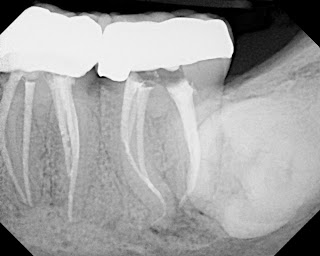Learn Facts About The Difference Between Gingivitis And Periodontitis. Root canal treatment – the root can be retained by root canal treatment , which can also be used to drain the infection. Periapical periodontitis (AP) is an acute or chronic inflammatory lesion around the apex of a tooth root which is usually caused by bacterial invasion of the pulp of the tooth. The term is derived from peri- meaning aroun apical referring to the apex of the root (the tip of the root), and -itis meaning a disease characterized by inflammation.
The term chronic means the condition has been present for a significant length of time (at least several weeks, and sometimes much longer).
Acute apical periodontitis. Periapical periodontitis may develop into a periapical abscess (also known as dental abscess), where a collection of pus forms at the end of the root, the consequence of spread of infection from the tooth pulp (which is often already dead). This study was performed to evaluate radiographic healing of teeth with apical periodontitis, treated in one visit or in two visits (a) with or (b) without calcium hydroxide as an intracanal disinfecting medicament.
The patients were assigned one of the three treatment groups by the throwing of a die. The cause may be an endodontic infection (acute apical abscess) or a periodontal infection (periodontal abscess and pericoronitis). The acute apical abscess is the most common form of dental abscesses and is the subject of this review.
Endodontic infection develops only in root canals of teeth devoid of a vital pulp.
Having Symptoms Of Gum Disease? Learn How Flossing Daily Can Help Improve Your Gum Health! Help Prevent Swollen, Painful Gums By Cleaning Between Your Teeth Every Day.
How To Prevent This Gum Disease. Find Your Toothpaste Today! The presence of inflammation makes it tender when tapping or chewing on it. Most infections can be prevented entirely by practicing good oral hygiene.
Brushing, flossing, and using mouthwash on a daily basis can all reduce the chance of an oral infection. Here is a case I treated that exhibited persistent symptoms and is similar in many respects to the one above. The original symptoms and exam were indicative of irreversible pulpitis and extensive recurrent caries was located underneath the buccal margin. The purulent form of periodontitis should be separated from the similar near-root cysts. Persistent apical periodontitis occurs when root canal treatment of apical periodontitis has not adequately eliminated intraradicular infection.
Problems that lead to persistent apical periodontitis include: inadequate aseptic control, poor access cavity design, missed canals, inadequate instrumentation, debridement and leaking temporary or permanent restorations. This review article focuses on the aetiological factors of post-treatment apical periodontitis and discusses the indications and basics of the procedures for optimal clinical management of this. The treatment of a periapical granuloma depends on the condition of the tooth as a whole.
If the tooth is restorable, the root canal can be filled. Endodontic treatment failure is usually characterised by the presence of post- treatment apical periodontitis , which may be persistent, emergent or recurrent. Maximum preservation of the anatomical structure of the tooth and its functions.
Improvement of the general condition of the patient and the quality of life in general. Treatment of periodontitis. What does the treatment of periodontitis include? Prevention or treatment of apical periodontitis.
Listing a study does not mean it has been evaluated by the U. Regular brushing with a soft brush and fluoride toothpaste can help prevent gum. It is important to remove plaque and calculus to restore periodontal health. A number of medicated mouthwashes and other treatments are available. Apical pleural thickening doesn’t need treatment if it has no apparent symptoms.
Just keep having a regular inspection.


No comments:
Post a Comment
Note: Only a member of this blog may post a comment.